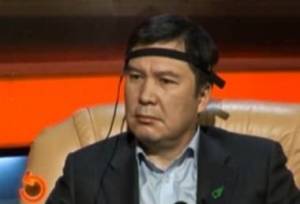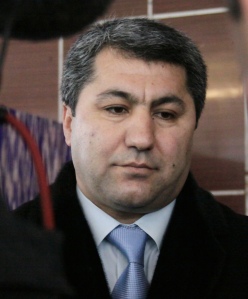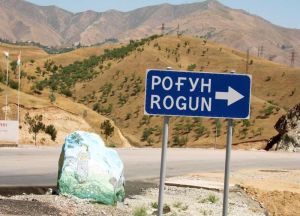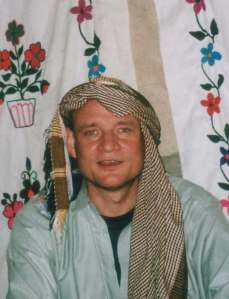The astonishingly cretinous will they/won’t they story of the U.S. Manas air transit center (in plain English, an air base) is creaking into life for another sorry round.
This time it is the Kyrgyzstan national boxing palladium — also known as the parliament — that is threatening, in language suggestive of a regretful nun casting off her habits, to “renounce” the treaty for the airbase’s presence at Bishkek’s international airport.
Something smells fishy here though. And it isn’t just recently released opposition head-case Kamchibek Tashiyev’s underpants.
First of all, the base deal is in any case set to expire in June 2014. This makes parliament’s move a formality so pointless it is surprising the chronically work-shy Kyrgyz legislators can be induced to withdraw their snouts from the trough for the time it will take for the vote to go ahead.
Empty symbolism then? In truth, this is an area the Zhogorku Kenesh excels.
The initiative comes from the government, however, which has somehow managed to fit this into its frenetic schedule between bouts of saving the country from economic, social and moral collapse. The renunciation bill is being presented to parliament, which has already approved the motion at committee stage, by deputy foreign minister Erlan Abdyldayev.
Kyrgyz budget will lose $200 million after the Manas transit center agreement denunciation; KyrTAG quotes the country’s first vice-prime Minister Djoomart Otorbayev as saying on Monday.
Earlier this month, deputy prime Joomart Otorbayev was cheerily informing the country how much further into staggering penury this will drive the state coffers. The United States pays around $60 million in lease annually for the base, which provides employment to 1,000 people and reportedly provides income for hundreds of supply companies.
One line of reasoning is that this is all part of a reorientation toward Russia, which purportedly intends to substantially expand its relatively modest Kant air base outside Bishkek. Following a visit to Kant earlier this year by Russian Defence Minister Sergei Shoigu, reports appeared alluding to plans to expand the runway, modernize facilities and generally turn the base in a top-notch aviation outpost for the NATO-style Collective Security Treaty Organisation.
If it is the Russians trying to push the Americans out (again), then one wonders what Moscow’s motivations are. It is almost as though they were trying to slow down progress in the withdrawal from Afghanistan, which will likely take place in unseemly haste whatever happens.
In fact, if the base agreement were to be allowed to expire in June (as has been amply advertised for years now), the Americans will simply have to remove all permanent military presence in Kyrgyzstan and ferry their soldiers out on packed long-haul flights like sweaty British holidaymakers on their way to Pattaya. Logistically, this seems like a major hitch rather than an apocalyptic cataclysm, despite all the fretting and underpants-soiling among useless, lamebrain American diplomats.
Only this week, the foreign affairs committee in parliament approved giving British military transportation transit rights through Kyrgyz airspace. In the event of an emergency, the aircraft could even land at Manas, said Transportation Minister Maksatbek Diykanov, before presumably adding a theatrical wink.
There may be more significance in this affair to be found on Kyrgyzstan’s bacchanalian local political scene.
Kicking out the Americans will play well after years of fairly absurd claims they have been poisoning the Kyrgyz countryside and killing every first born child and heaven knows what else. (Admittedly, crashing a plane and possibly narrowly missing some densely populated village the other month can’t really have helped their cause).
This nationalist, philo-Russian stance will prove particularly useful now that the xenophobic contingent has come back into force with the release of pugnacious southerner Tashiyev and his chums. Also in that general political quarter, serious competition is in the offing from roly-poly Osh mayor Melis Myrzakmatov, who now scrubs up well, has stopped speaking with his mouth full and could make a run on a national stage when the opportunity presents itself; namely, at the next presidential elections.
Not that having been the government that kicked out the Americans will be particularly significant electorally, but having the Kremlin onside will surely help. The last person that angered Moscow over Manas is now moodily sucking on kompot cordials through a straw in the garden of a Belarusian dacha like something out of the world’s worst staging of Chekhov.
It is the relaxed air with which Bishkek says thank you, but no thank you to substantial amounts of easy cash from the Americans that creates much room for doubt.
The speculation doing the rounds when this pointless denunciation/renunciation thing first became public was that Kyrgyzstan might be in the process of pulling another three-card trick: Putting the proposal to parliament, which would then vote down the bill and then give the government coverage to negotiate another lucrative one-year extension. This scenario would require a pliant parliament, however, and this lot of legislators is anything but cooperative.
If the base does go, the government needs to find a way of plugging a new circa $100 million annual hole in the budget. With the Kumtor gold mine cash cow constantly tottering due to public unrest, incited by the rabble-rousing nationalists, the addition to the deficit almost seems like a triviality, but still.
For all the belly-aching, Manas won’t make or break Kyrgyzstan. Its disappearance will only simply further isolate a country that needs as many friends as it can get and further pauperize a state barely able to provide for its population.
The only thing that matter about Manas is how little it ultimately matters.











